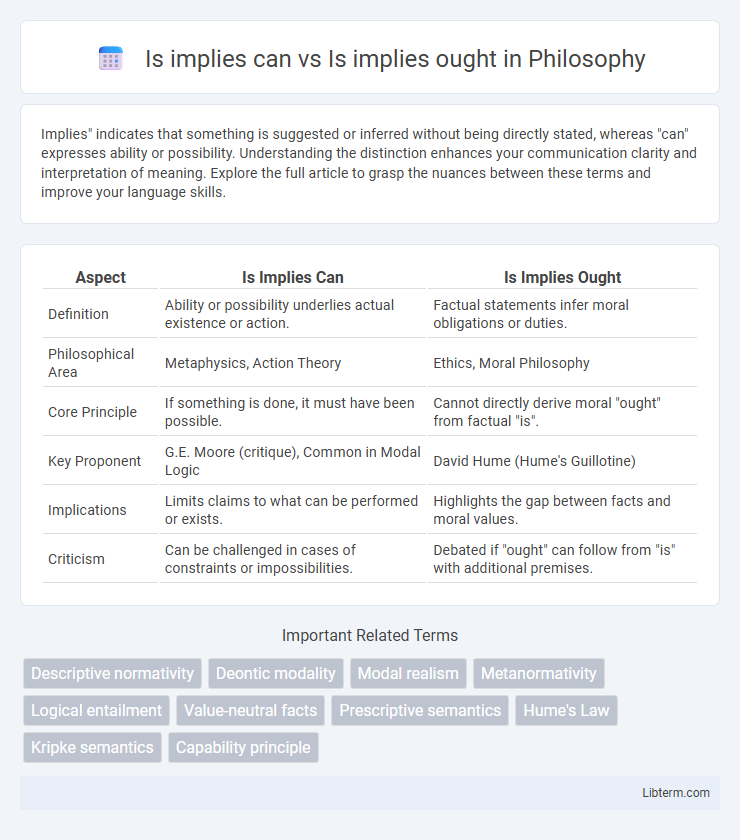Implies" indicates that something is suggested or inferred without being directly stated, whereas "can" expresses ability or possibility. Understanding the distinction enhances your communication clarity and interpretation of meaning. Explore the full article to grasp the nuances between these terms and improve your language skills.
Table of Comparison
| Aspect | Is Implies Can | Is Implies Ought |
|---|---|---|
| Definition | Ability or possibility underlies actual existence or action. | Factual statements infer moral obligations or duties. |
| Philosophical Area | Metaphysics, Action Theory | Ethics, Moral Philosophy |
| Core Principle | If something is done, it must have been possible. | Cannot directly derive moral "ought" from factual "is". |
| Key Proponent | G.E. Moore (critique), Common in Modal Logic | David Hume (Hume's Guillotine) |
| Implications | Limits claims to what can be performed or exists. | Highlights the gap between facts and moral values. |
| Criticism | Can be challenged in cases of constraints or impossibilities. | Debated if "ought" can follow from "is" with additional premises. |
Understanding "Is Implies Can
The principle "Is implies Can" asserts that if something is the case, then it must be possible to do it, grounding the relationship between factual existence and ability. This concept plays a crucial role in ethics and philosophy by linking moral responsibility to the feasibility of actions or choices. Understanding "Is implies Can" helps clarify debates on accountability, as individuals cannot be morally obligated to perform actions that are impossible.
Understanding "Is Implies Ought
Understanding "Is Implies Ought" involves recognizing the philosophical debate on whether descriptive statements ("is") can determine prescriptive conclusions ("ought"). This concept challenges the idea that factual realities alone provide a sufficient basis for moral obligations or normative claims. Clarifying the distinction between empirical facts and ethical imperatives is crucial for accurately interpreting the "is-ought" problem articulated by David Hume.
Philosophical Foundations of "Is" Statements
Is" statements in philosophy refer to descriptive claims that assert what exists or how things are, grounded in empirical observation or logical analysis. The distinction between "is" and "ought" highlights the challenge that factual statements (what "is") do not inherently prescribe moral or normative conclusions (what "ought" to be), a problem central to ethical theory known as the is-ought gap introduced by David Hume. Understanding the semantic and epistemological foundations of "is" statements involves analyzing how language conveys truth conditions about reality without imposing evaluative judgments.
Historical Context: Hume’s Is-Ought Problem
David Hume's Is-Ought problem highlights the logical gap between descriptive statements ("is") and prescriptive ethical claims ("ought"). In his 18th-century work, Hume argued that factual observations about the world cannot directly justify moral imperatives, exposing a fundamental challenge in moral philosophy and ethical reasoning. This problem has profoundly influenced meta-ethics by questioning how objective moral values can be derived from empirical facts.
Can" and Human Capacity: Conceptual Overview
Is implies can highlights the intrinsic link between existence and potential action, emphasizing that what is true or real inherently encompasses the capacity to act or change. Human capacity, as a multidimensional construct, embodies cognitive, emotional, and physical potentials enabling individuals to perform various functions and adapt to dynamic environments. Understanding the nexus between "can" and human capability provides a foundational framework for evaluating agency, responsibility, and practical feasibility in ethical, psychological, and social contexts.
Moral Philosophy: Ought From Is Debate
The "Is implies can" principle asserts that moral obligations presuppose the ability to perform the required actions, emphasizing feasibility in ethical responsibility. In contrast, the "Is implies ought" debate questions whether moral imperatives can be derived directly from empirical facts, challenging the logical derivation of normative statements from descriptive realities. Moral philosophy critically explores whether "ought" statements can be justified solely based on "is" premises, highlighting the naturalistic fallacy concern within ethical reasoning.
Logical Structure: Comparing "Is Implies Can" vs "Is Implies Ought
The logical structure of "Is implies can" asserts that if something is true or exists (is), then it must be possible (can), emphasizing a foundational relationship between actuality and capability. In contrast, "Is implies ought" suggests that factual statements (is) inherently contain moral prescriptions (ought), often critiqued as committing a logical fallacy by conflating descriptive and normative claims. Comparing both highlights critical distinctions in reasoning: "Is implies can" addresses possibility grounded in reality, while "Is implies ought" connects facts to ethics, challenging the boundary between descriptive truths and moral imperatives.
Critiques and Counterarguments
The distinction between "is implies can" and "is implies ought" raises significant debates in moral philosophy, particularly in the interpretation of Hume's law and Kantian ethics. Critics argue that conflating descriptive statements ("is") with prescriptive norms ("ought") leads to the naturalistic fallacy, undermining objective moral reasoning. Counterarguments suggest that some ethical frameworks, such as virtue ethics, allow for a nuanced understanding where capacity ("can") informs moral responsibility ("ought"), challenging strict separation.
Practical Implications in Ethics and Decision Making
Is implies can establishes that moral obligations depend on an individual's actual ability to perform an action, ensuring ethical demands are realistic and achievable. Conversely, is implies ought highlights the transition from descriptive facts to prescriptive norms, emphasizing that ethical decisions must be informed by factual realities but cannot be derived solely from them. Understanding these distinctions frames ethical reasoning and decision-making to balance feasibility with normative principles, enhancing practical moral judgments.
Contemporary Discussions and Future Directions
Contemporary discussions on "Is implies can" emphasize the logical connection between possibility and existence, asserting that if something is the case, then it must be possible to be so. In contrast, debates around "Is implies ought" explore the challenging transition from descriptive statements to prescriptive norms, questioning whether factual truths inherently generate moral obligations. Future directions in philosophy aim to integrate empirical findings from cognitive science with normative ethics to clarify how descriptive realities influence ethical imperatives and practical reasoning.
Is implies can Infographic

 libterm.com
libterm.com